A Comparative Study of Individual and Group Decision-Making
VerifiedAdded on 2023/06/15
|5
|1104
|360
Essay
AI Summary
This essay provides a comparative analysis of individual and group decision-making processes, highlighting the similarities and differences between the two approaches. It discusses the advantages and disadvantages of each method, noting that individual decision-making is faster and more straightforward but can be biased and lack thorough analysis, while group decision-making benefits from diverse perspectives and increased commitment but may suffer from conflicts and time inefficiencies. The essay concludes that both methods have their strengths and weaknesses and can be used effectively in different situations to achieve optimal results. Desklib offers a variety of resources, including solved assignments and past papers, to further assist students in understanding decision-making processes.
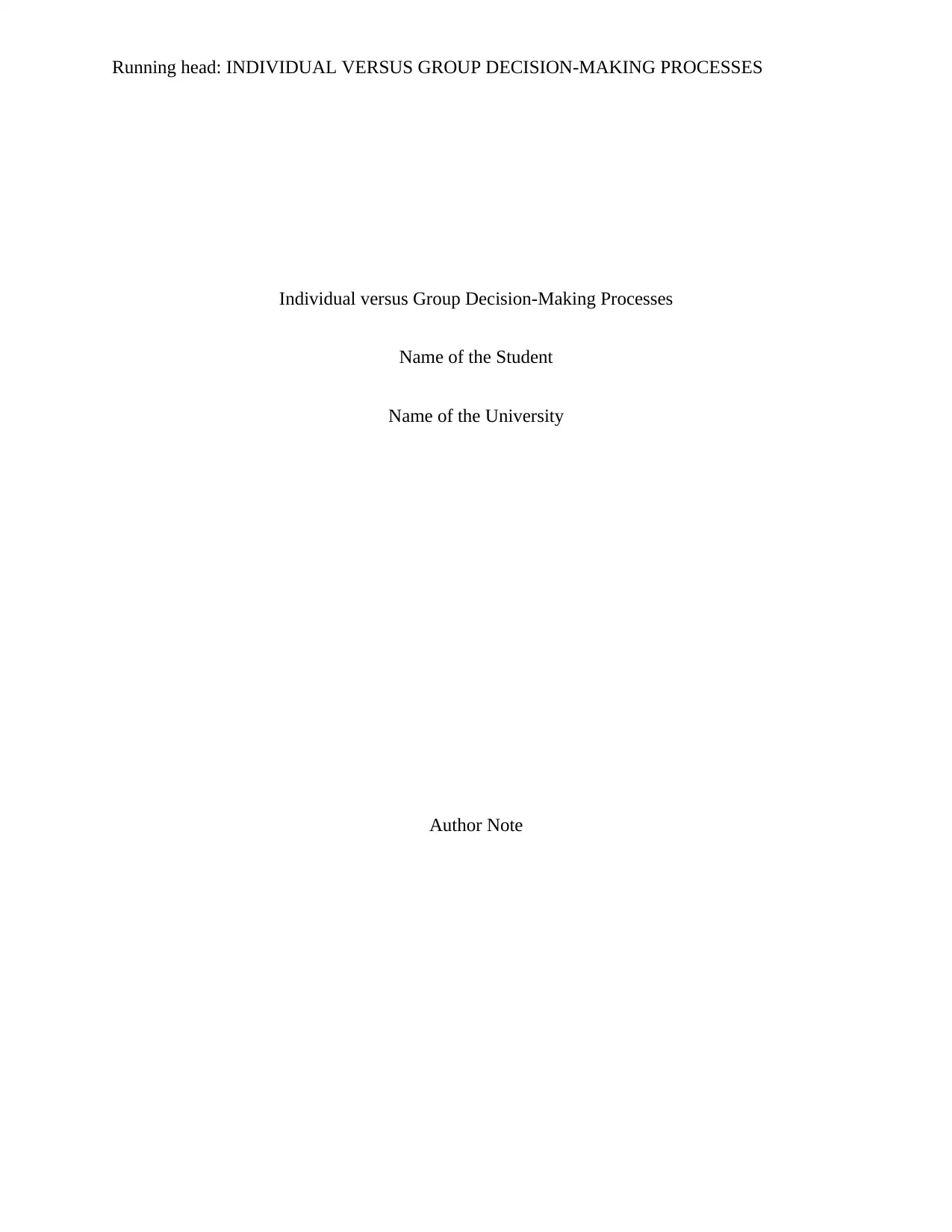
Running head: INDIVIDUAL VERSUS GROUP DECISION-MAKING PROCESSES
Individual versus Group Decision-Making Processes
Name of the Student
Name of the University
Author Note
Individual versus Group Decision-Making Processes
Name of the Student
Name of the University
Author Note
Paraphrase This Document
Need a fresh take? Get an instant paraphrase of this document with our AI Paraphraser
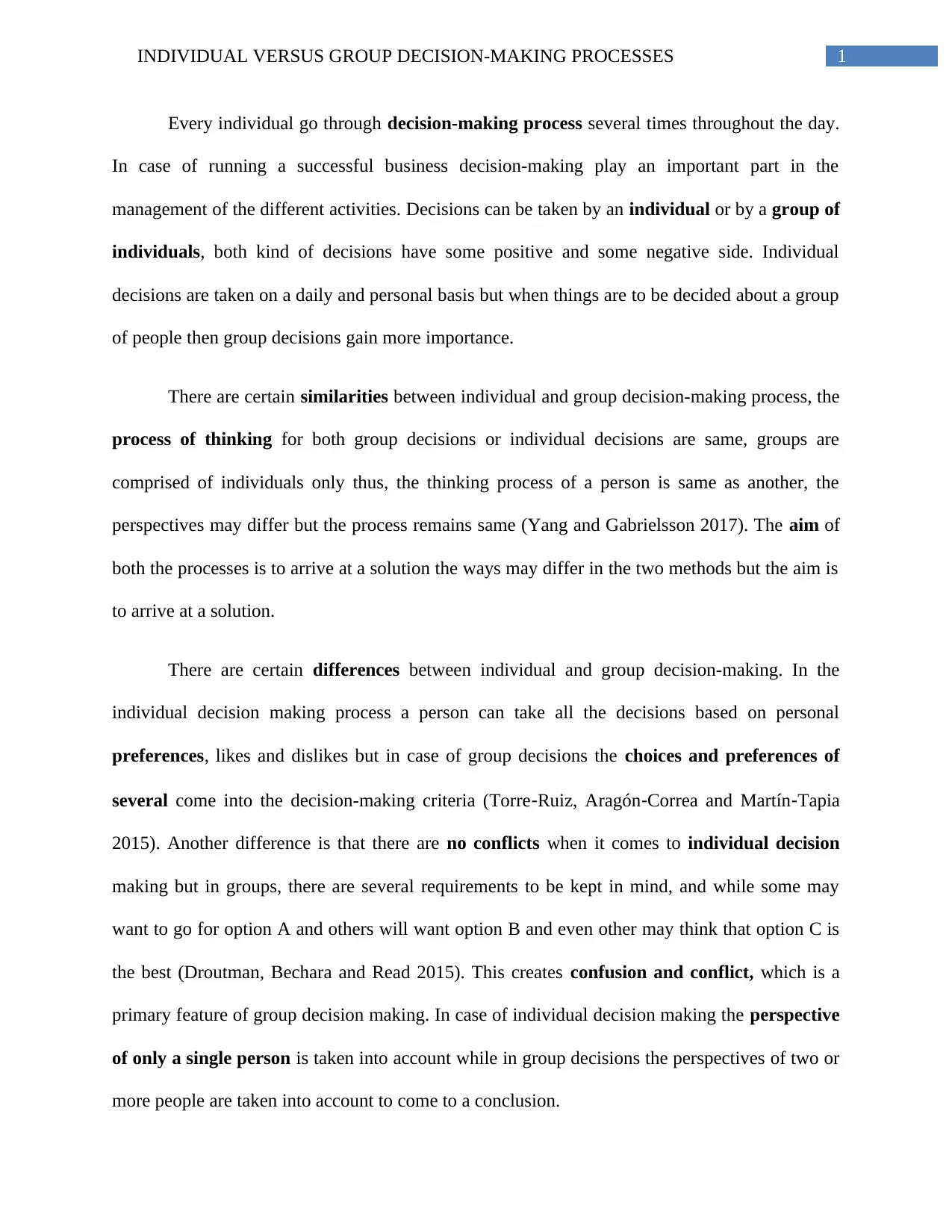
1INDIVIDUAL VERSUS GROUP DECISION-MAKING PROCESSES
Every individual go through decision-making process several times throughout the day.
In case of running a successful business decision-making play an important part in the
management of the different activities. Decisions can be taken by an individual or by a group of
individuals, both kind of decisions have some positive and some negative side. Individual
decisions are taken on a daily and personal basis but when things are to be decided about a group
of people then group decisions gain more importance.
There are certain similarities between individual and group decision-making process, the
process of thinking for both group decisions or individual decisions are same, groups are
comprised of individuals only thus, the thinking process of a person is same as another, the
perspectives may differ but the process remains same (Yang and Gabrielsson 2017). The aim of
both the processes is to arrive at a solution the ways may differ in the two methods but the aim is
to arrive at a solution.
There are certain differences between individual and group decision-making. In the
individual decision making process a person can take all the decisions based on personal
preferences, likes and dislikes but in case of group decisions the choices and preferences of
several come into the decision-making criteria (Torre‐Ruiz, Aragón‐Correa and Martín‐Tapia
2015). Another difference is that there are no conflicts when it comes to individual decision
making but in groups, there are several requirements to be kept in mind, and while some may
want to go for option A and others will want option B and even other may think that option C is
the best (Droutman, Bechara and Read 2015). This creates confusion and conflict, which is a
primary feature of group decision making. In case of individual decision making the perspective
of only a single person is taken into account while in group decisions the perspectives of two or
more people are taken into account to come to a conclusion.
Every individual go through decision-making process several times throughout the day.
In case of running a successful business decision-making play an important part in the
management of the different activities. Decisions can be taken by an individual or by a group of
individuals, both kind of decisions have some positive and some negative side. Individual
decisions are taken on a daily and personal basis but when things are to be decided about a group
of people then group decisions gain more importance.
There are certain similarities between individual and group decision-making process, the
process of thinking for both group decisions or individual decisions are same, groups are
comprised of individuals only thus, the thinking process of a person is same as another, the
perspectives may differ but the process remains same (Yang and Gabrielsson 2017). The aim of
both the processes is to arrive at a solution the ways may differ in the two methods but the aim is
to arrive at a solution.
There are certain differences between individual and group decision-making. In the
individual decision making process a person can take all the decisions based on personal
preferences, likes and dislikes but in case of group decisions the choices and preferences of
several come into the decision-making criteria (Torre‐Ruiz, Aragón‐Correa and Martín‐Tapia
2015). Another difference is that there are no conflicts when it comes to individual decision
making but in groups, there are several requirements to be kept in mind, and while some may
want to go for option A and others will want option B and even other may think that option C is
the best (Droutman, Bechara and Read 2015). This creates confusion and conflict, which is a
primary feature of group decision making. In case of individual decision making the perspective
of only a single person is taken into account while in group decisions the perspectives of two or
more people are taken into account to come to a conclusion.
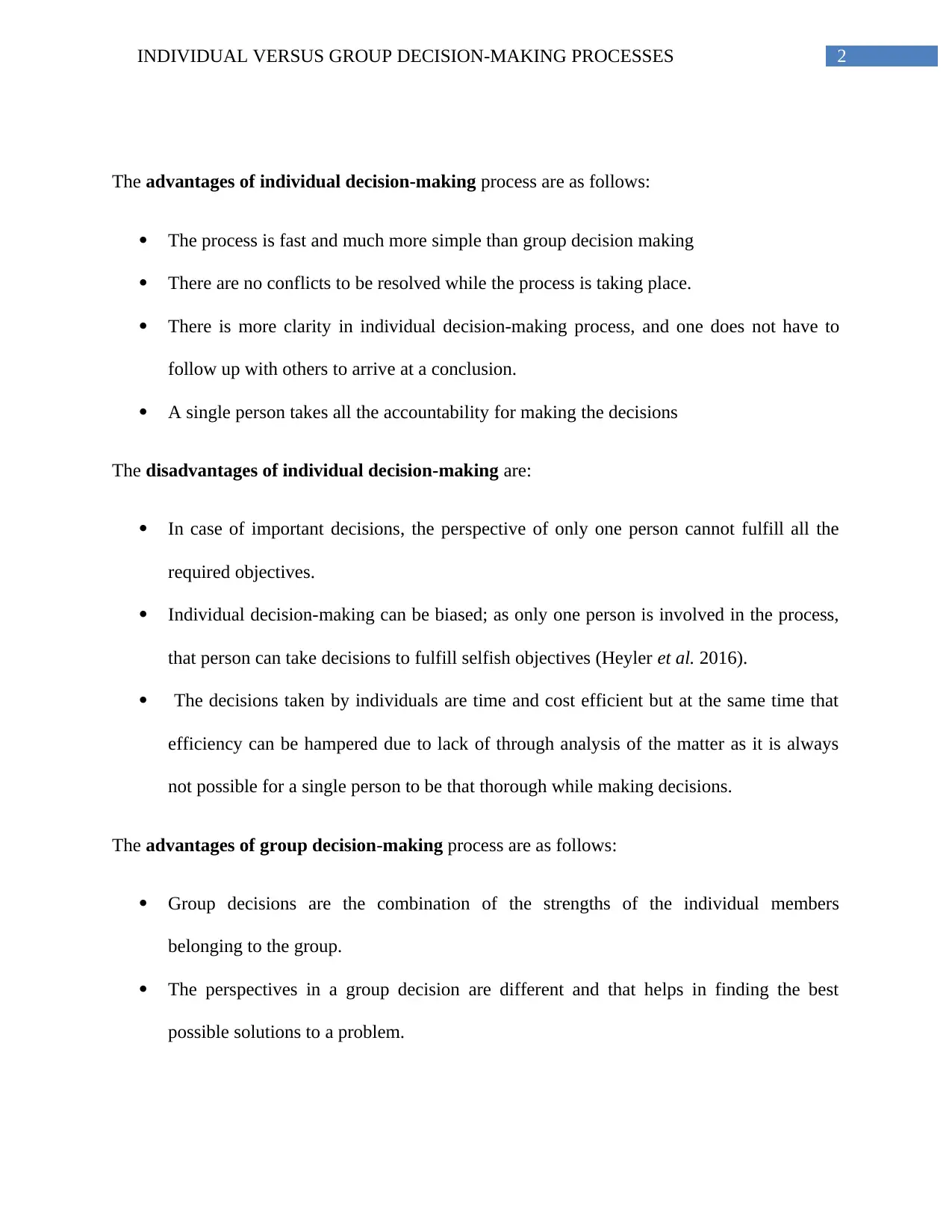
2INDIVIDUAL VERSUS GROUP DECISION-MAKING PROCESSES
The advantages of individual decision-making process are as follows:
The process is fast and much more simple than group decision making
There are no conflicts to be resolved while the process is taking place.
There is more clarity in individual decision-making process, and one does not have to
follow up with others to arrive at a conclusion.
A single person takes all the accountability for making the decisions
The disadvantages of individual decision-making are:
In case of important decisions, the perspective of only one person cannot fulfill all the
required objectives.
Individual decision-making can be biased; as only one person is involved in the process,
that person can take decisions to fulfill selfish objectives (Heyler et al. 2016).
The decisions taken by individuals are time and cost efficient but at the same time that
efficiency can be hampered due to lack of through analysis of the matter as it is always
not possible for a single person to be that thorough while making decisions.
The advantages of group decision-making process are as follows:
Group decisions are the combination of the strengths of the individual members
belonging to the group.
The perspectives in a group decision are different and that helps in finding the best
possible solutions to a problem.
The advantages of individual decision-making process are as follows:
The process is fast and much more simple than group decision making
There are no conflicts to be resolved while the process is taking place.
There is more clarity in individual decision-making process, and one does not have to
follow up with others to arrive at a conclusion.
A single person takes all the accountability for making the decisions
The disadvantages of individual decision-making are:
In case of important decisions, the perspective of only one person cannot fulfill all the
required objectives.
Individual decision-making can be biased; as only one person is involved in the process,
that person can take decisions to fulfill selfish objectives (Heyler et al. 2016).
The decisions taken by individuals are time and cost efficient but at the same time that
efficiency can be hampered due to lack of through analysis of the matter as it is always
not possible for a single person to be that thorough while making decisions.
The advantages of group decision-making process are as follows:
Group decisions are the combination of the strengths of the individual members
belonging to the group.
The perspectives in a group decision are different and that helps in finding the best
possible solutions to a problem.
⊘ This is a preview!⊘
Do you want full access?
Subscribe today to unlock all pages.

Trusted by 1+ million students worldwide
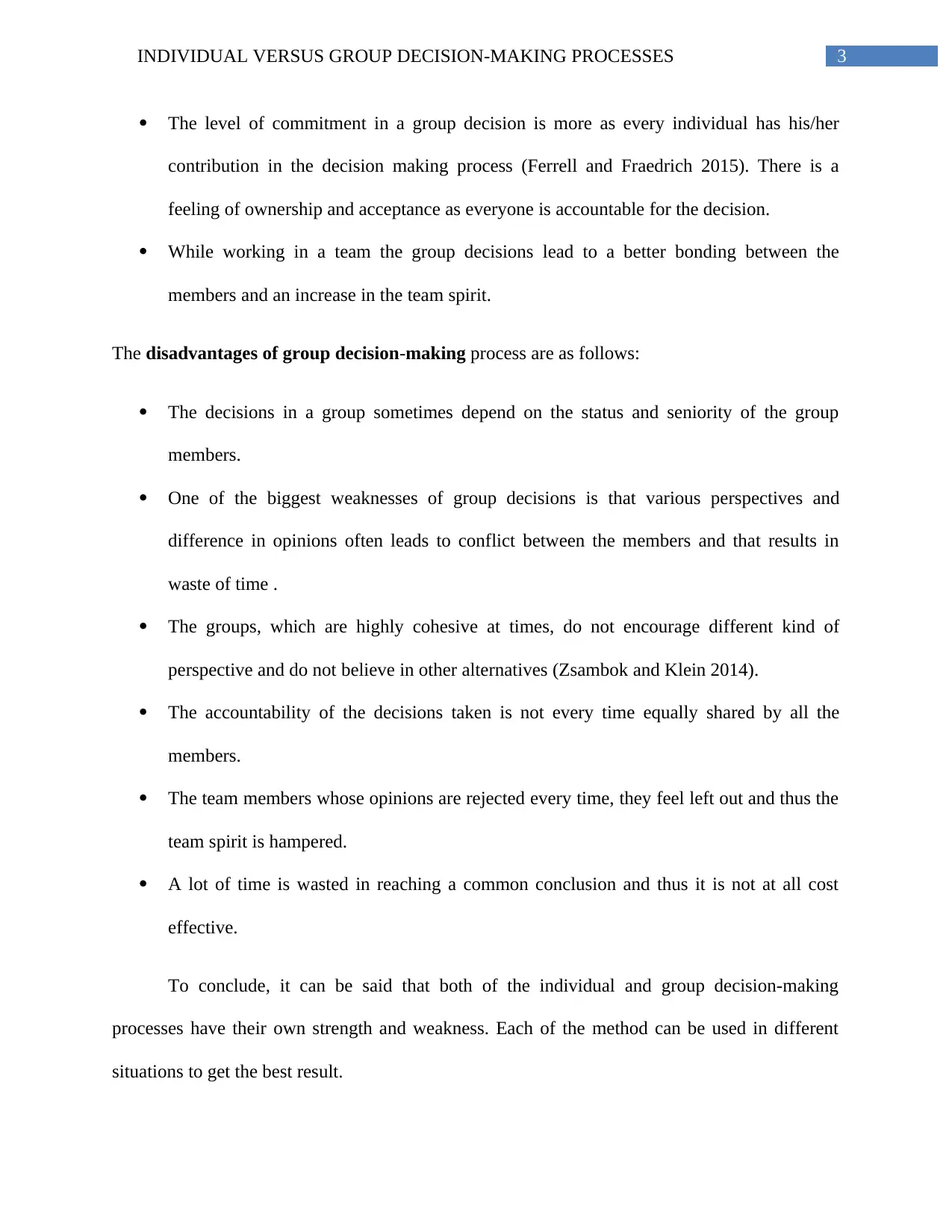
3INDIVIDUAL VERSUS GROUP DECISION-MAKING PROCESSES
The level of commitment in a group decision is more as every individual has his/her
contribution in the decision making process (Ferrell and Fraedrich 2015). There is a
feeling of ownership and acceptance as everyone is accountable for the decision.
While working in a team the group decisions lead to a better bonding between the
members and an increase in the team spirit.
The disadvantages of group decision-making process are as follows:
The decisions in a group sometimes depend on the status and seniority of the group
members.
One of the biggest weaknesses of group decisions is that various perspectives and
difference in opinions often leads to conflict between the members and that results in
waste of time .
The groups, which are highly cohesive at times, do not encourage different kind of
perspective and do not believe in other alternatives (Zsambok and Klein 2014).
The accountability of the decisions taken is not every time equally shared by all the
members.
The team members whose opinions are rejected every time, they feel left out and thus the
team spirit is hampered.
A lot of time is wasted in reaching a common conclusion and thus it is not at all cost
effective.
To conclude, it can be said that both of the individual and group decision-making
processes have their own strength and weakness. Each of the method can be used in different
situations to get the best result.
The level of commitment in a group decision is more as every individual has his/her
contribution in the decision making process (Ferrell and Fraedrich 2015). There is a
feeling of ownership and acceptance as everyone is accountable for the decision.
While working in a team the group decisions lead to a better bonding between the
members and an increase in the team spirit.
The disadvantages of group decision-making process are as follows:
The decisions in a group sometimes depend on the status and seniority of the group
members.
One of the biggest weaknesses of group decisions is that various perspectives and
difference in opinions often leads to conflict between the members and that results in
waste of time .
The groups, which are highly cohesive at times, do not encourage different kind of
perspective and do not believe in other alternatives (Zsambok and Klein 2014).
The accountability of the decisions taken is not every time equally shared by all the
members.
The team members whose opinions are rejected every time, they feel left out and thus the
team spirit is hampered.
A lot of time is wasted in reaching a common conclusion and thus it is not at all cost
effective.
To conclude, it can be said that both of the individual and group decision-making
processes have their own strength and weakness. Each of the method can be used in different
situations to get the best result.
Paraphrase This Document
Need a fresh take? Get an instant paraphrase of this document with our AI Paraphraser
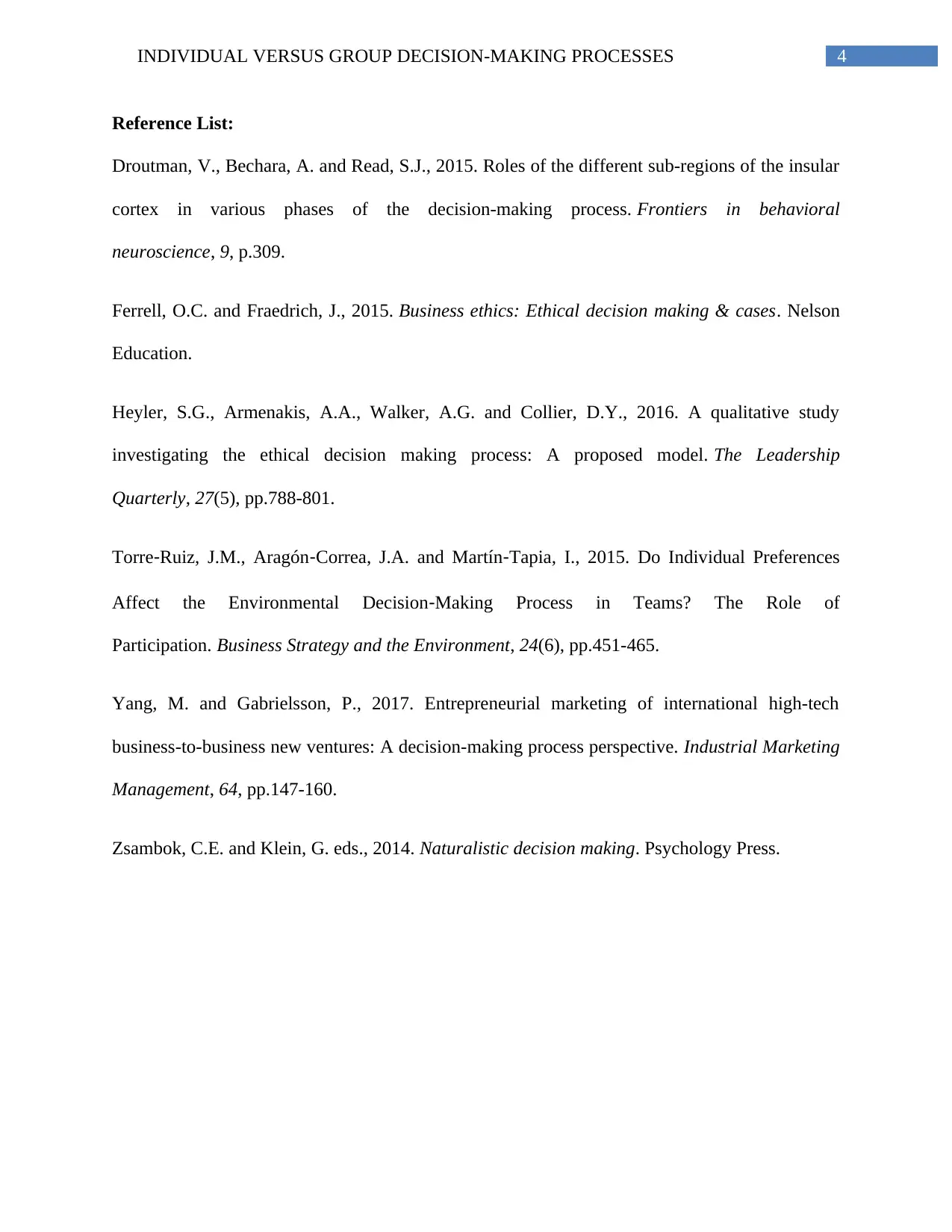
4INDIVIDUAL VERSUS GROUP DECISION-MAKING PROCESSES
Reference List:
Droutman, V., Bechara, A. and Read, S.J., 2015. Roles of the different sub-regions of the insular
cortex in various phases of the decision-making process. Frontiers in behavioral
neuroscience, 9, p.309.
Ferrell, O.C. and Fraedrich, J., 2015. Business ethics: Ethical decision making & cases. Nelson
Education.
Heyler, S.G., Armenakis, A.A., Walker, A.G. and Collier, D.Y., 2016. A qualitative study
investigating the ethical decision making process: A proposed model. The Leadership
Quarterly, 27(5), pp.788-801.
Torre‐Ruiz, J.M., Aragón‐Correa, J.A. and Martín‐Tapia, I., 2015. Do Individual Preferences
Affect the Environmental Decision‐Making Process in Teams? The Role of
Participation. Business Strategy and the Environment, 24(6), pp.451-465.
Yang, M. and Gabrielsson, P., 2017. Entrepreneurial marketing of international high-tech
business-to-business new ventures: A decision-making process perspective. Industrial Marketing
Management, 64, pp.147-160.
Zsambok, C.E. and Klein, G. eds., 2014. Naturalistic decision making. Psychology Press.
Reference List:
Droutman, V., Bechara, A. and Read, S.J., 2015. Roles of the different sub-regions of the insular
cortex in various phases of the decision-making process. Frontiers in behavioral
neuroscience, 9, p.309.
Ferrell, O.C. and Fraedrich, J., 2015. Business ethics: Ethical decision making & cases. Nelson
Education.
Heyler, S.G., Armenakis, A.A., Walker, A.G. and Collier, D.Y., 2016. A qualitative study
investigating the ethical decision making process: A proposed model. The Leadership
Quarterly, 27(5), pp.788-801.
Torre‐Ruiz, J.M., Aragón‐Correa, J.A. and Martín‐Tapia, I., 2015. Do Individual Preferences
Affect the Environmental Decision‐Making Process in Teams? The Role of
Participation. Business Strategy and the Environment, 24(6), pp.451-465.
Yang, M. and Gabrielsson, P., 2017. Entrepreneurial marketing of international high-tech
business-to-business new ventures: A decision-making process perspective. Industrial Marketing
Management, 64, pp.147-160.
Zsambok, C.E. and Klein, G. eds., 2014. Naturalistic decision making. Psychology Press.
1 out of 5
Related Documents
Your All-in-One AI-Powered Toolkit for Academic Success.
+13062052269
info@desklib.com
Available 24*7 on WhatsApp / Email
![[object Object]](/_next/static/media/star-bottom.7253800d.svg)
Unlock your academic potential
Copyright © 2020–2025 A2Z Services. All Rights Reserved. Developed and managed by ZUCOL.





